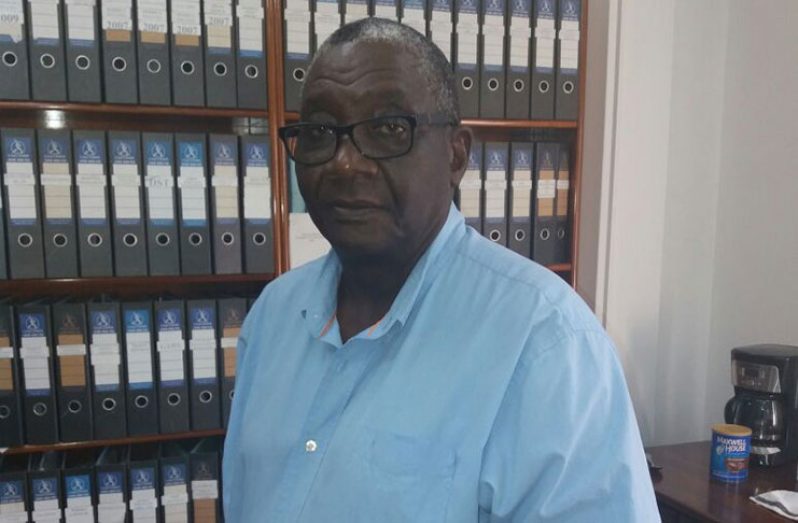— Dr Davis says most of $30B bond will be spent in these areas
GUYANA Sugar Corporation (GuySuCo) Director of Agricultural Services, Dr. Harold Davis Jnr, anticipates that approximately 60 per cent of the $30B, secured through a syndicated bond, will be utilised to modernise the remaining factories, and the balance would likely be used to significantly enhance agricultural services within the industry.
In a recent interview with the Guyana Chronicle at his La Bonne Intention (LBI) Estate office on the East Coast of Demerara, Dr. Davis said that if the sugar industry is to be competitive, it must be modernised, and the upgrading of the factories is critical to the process.
“It will go towards field development, it will go towards acquiring new machineries but most of the money I think will be spent on factories…. The factories are old and they need a lot of investment, so the bulk of the money will, I think, be spent on factories… I would say that 60 per cent of the monies will go to the factories and the rest of it will be spent on agriculture development,” he told this newspaper.
Blairmont on the West Bank of Berbice; Albion-Rose Hall in East Berbice; and the Uitvlugt-Wales in West Demerara are the three estates remaining under the management of GuySuCo. They are complete with factories and are being supplied with cane from various locations.
According to the Food and Agriculture Organisation (FAO), “mechanisation covers all levels of farming and processing technologies, from simple and basic hand tools to more sophisticated and motorised equipment”. It reduces hard labour and simultaneously improves productivity and timeliness of agricultural operations, thereby improving the efficient use of resources and market access.
FAR WAY TO GO
While the sugar industry has undergone some levels of mechanisation, Dr. Davis believes that it has a far way to go.
“The work of mechanisation in this industry started way back in the 1970s, long before it was nationalised. We had different periods under which advancements were made in the identification of equipment and technology that can do it…so we have made strides in finding equipment that can work in this industry. At least 60 per cent of our canes are loaded by machines… we have identified technology that drain and effectively manage it in a mechanised manner but what is necessary is to find the resources to make it a widespread reality,” GuySuCo’s director of agricultural services explained.
He clarified that while a percentage of the cane fields were developed in the past to allow for mechanise harvesting, it was not an indication that a large percentage of the industry had been mechanised.
“As I indicated about 60 per cent of our canes can be loaded mechanically, but that doesn’t mean that 60 per cent of the industry is mechanised, it is not mechanised,” Dr. Davis further clarified.
But as the corporation moves to up the level of mechanisation within the sugar industry, the director posited that the move will include retooling of factories to facilitate the new diversification programme which will see significant attention being placed on plantation white sugar and cogeneration.
WHITE SUGAR
He said that GuySuCo is aiming to produce ‘Plantation White Sugar’ to sell into the local, CARICOM, and USA markets – a move that would see the corporation earning more and simultaneously displacing the importation of refined sugar regionally.
“If the Caribbean produces enough white sugar it means that you could put what you call the Common Exchange Tariff (CET) on the product. Automatically, it means that any white sugar that comes into the country, (importers) will have to pay a tariff because it is a local product, meaning that it is produced in Guyana, Jamaica and Belize,” Dr. Davis explained.
Another significant revenue earner for the corporation would be cogeneration, the director of agriculture anticipates. GuySuCo had sold its co-generation plant at a cost of US$30M to Skeldon Energy Inc (SEI) – a special purpose company owned by the National Industrial and Commercial Limited (NICIL) and the Guyana Power and Light (GPL). However, SEI has fallen on tough times, and according to Dr. Davis, GuySuCo has learnt from its mistakes.
“We have had issues with the boilers and there were mistakes made but we would have learnt from those errors. Co-generation is one of the few things that would transform a sugar cane industry into a very profitable exercise and so we hope to do more of that,” he posited.
But whether it is the production of brown sugar, refined sugar or electricity through cogeneration, Dr. Davis said the sugar industry must not be labour intensive.
“The sugar industry that we have is a labour intensive industry. Looking at it philosophically we would have to hire a more skilled workforce, quite naturally with the modernisation of the industry we are looking to mechanise a lot of our operations. What we cannot go back to is a labour intensive sugar industry, we can’t go back there we have to change this industry if it is going to be competitive, it has got to be a modernised industry,” he explained.
The Special Purpose Unit (SPU) secured the $30B syndicated bond to aid in the revitalisation of the country’s sugar industry. The SPU – an important arm of the NICIL – through its head Colvin Heath-London, disclosed that the $30B bond will be made available within two weeks, and will be repaid within a period of five years.




.png)









